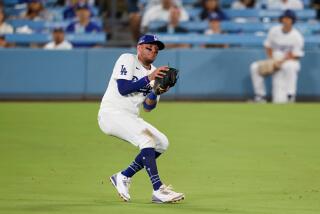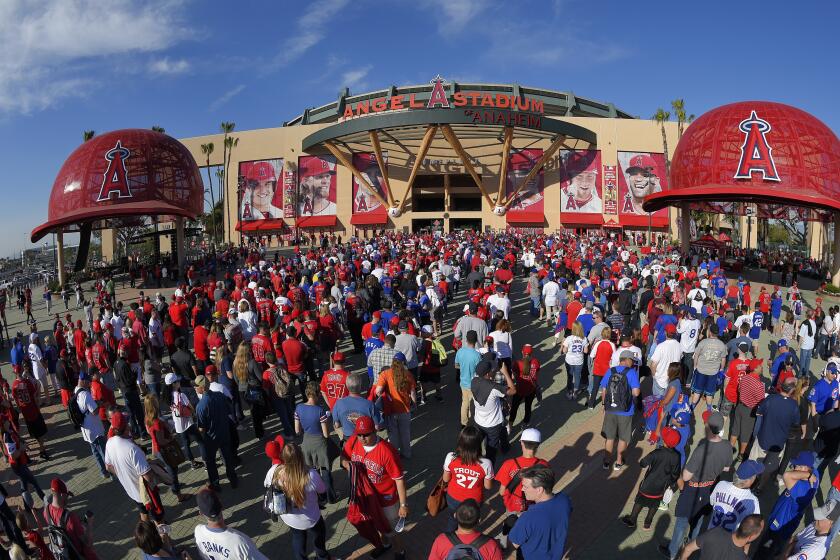Analysis : Rojas Needed a Chance to Learn the Ropes Before He Had to Grab Hold
- Share via
Now that Cookie Ball has run its turbulent course, one is reminded of these words of wisdom from Preston Gomez, delivered during spring training after the Angels’ managerial reins were handed from Gene Mauch to a rookie named Cookie Rojas:
“I can learn to fly an airplane by books, but when I get up in the air, I’m going to crash that S.O.B.”
Gomez is a former big-league manager and longtime friend of Rojas--”He’s like a son,” Gomez says--so the words weren’t intended to hurt or denigrate the fledgling manager.
They merely spoke the truth.
Baseball may be a simple game, but no one ever said running a baseball team was simple. Jim Fregosi, rumored to be a potential successor to Rojas, discovered as much after lasting less than three seasons in his first big-league managerial job with the Angels. When he was fired, Fregosi became a minor-league manager at triple-A Louisville, where he finally was able to learn his craft away from the glare and scrutiny of the major leagues.
He resurfaced with the Chicago White Sox a more mature, and assured, manager.
Rojas never had that type of apprenticeship. He never had the time. The Angels’ job wasn’t given to him in March; it ambushed him. One day, he’s in camp working on fundamentals with Angel infielders, and the next, he’s in charge of the whole operation after Mauch’s sudden departure.
Rojas jumped at the opportunity--as any other Angel coach would have--but, in essence, he was attempting the fly by books.
He stayed up in the air for 154 games.
Then, on Friday morning, the plane crashed.
For the most part, Rojas retained good rapport with his players. The Angels’ clubhouse, as friendly as the DMZ in recent seasons, loosened up immensely under Rojas. Players began joking with one another. They actually went out to dinner together. They organized a kangaroo court.
But when it came to on-the-field performance--the bottom line, as Angel General Manager Mike Port puts it--Rojas found himself little less than overwhelmed.
Many of his moves, both strategic and personnel, defied explanation. For example:
--Pushing for the release of Bill Buckner so he could keep pinch-runner Junior Noboa on the roster.
--Pinch-hitting George Hendrick for his top run-producer, Chili Davis, in the ninth inning of a close game in Yankee Stadium.
--Watching Mike Witt regain his form and self-assurance in mid-June, then depriving him of a shutout by pulling him from a 5-0 game with two outs in the ninth.
--Stubbornly relying on intentional walks, calling for them as early as the third inning and consistently compounding difficult situations for such young pitchers as Chuck Finley, Terry Clark and Willie Fraser.
--Undermining the confidence of Finley with quick and early hooks and confusing third baseman Jack Howell with a seemingly random pinch-hit policy--sometimes Howell would hit against the left-hander, sometimes he wouldn’t.
--Saying he would never pitch tender-armed Kirk McCaskill on three days’ rest, breaking that vow three weeks later and then letting him throw a grueling 145 pitches in his next start, which would be McCaskill’s last of the season.
Rojas often appeared insecure, which he tried to mask with macho posturing and obvious attempts to exert authority. He’d yell at reporters when players were within earshot, as if to show who was in charge. He rushed the mound in Cleveland, heading a bench-clearing brawl that got relief pitcher Donnie Moore hurt. He ordered all injury information to the media channeled through him--and then would contradict himself from day to day. (Bryan Harvey, remember, was only going to miss “a day or so.”)
To his credit, Rojas dug himself out of the Angels’ early-season hole, righting a 24-40 start with a 31-11 run through late June and July. But when the Angels dipped again in September, and knowing his job was on the line, Rojas began to press.
The Angels fell out of contention, but Rojas kept trotting out his tired regulars, ignoring such prospects as Dante Bichette and Vance Lovelace. He forgot how many times Rich Monteleone had been visited on the mound in one inning. He started to alibi.
“I can’t control injuries,” Rojas said in his final postgame interview as Angel manager Thursday night. “Bryan Harvey’s hurt, Bob Boone, (Tony) Armas, (Greg) Minton, Devon White.
“What the hell do you want me to do? I’m not a magician.”
Rojas continued on in this vein, eyes darting, decibels climbing, sounding as if he were a drowning man grasping for a life preserver.
Moose Stubing, Rojas’ successor as interim manager, said he could see a change in his friend and golfing partner in recent days.
“I know he had a lot of things playing on his mind,” Stubing said. “He told me hadn’t been sleeping. Maybe he was (pressing).”
As for Rojas’ rather unconventional strategic style, Stubing shrugged.
“You don’t go three months with the best record in baseball without doing something right,” said Stubing, alluding to Rojas’ 31-11 midseason stretch. “Every move you make is not going to work. A lot of guys manage with their heart. Cookie was that kind of man.”
With Cookie Rojas, the heart was more than willing. But heart will only take you so far in a job where experience and know-how are so vital.
Pilot-training schools exist for a reason.
More to Read
Go beyond the scoreboard
Get the latest on L.A.'s teams in the daily Sports Report newsletter.
You may occasionally receive promotional content from the Los Angeles Times.








